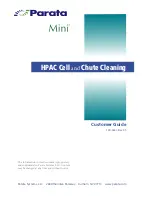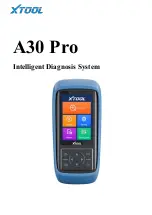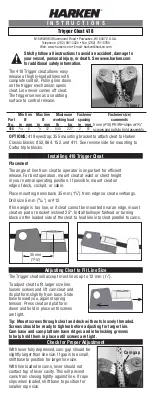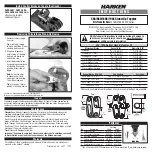
23
Multiple parameter
This consists of several editable parts:
Press enter repeatedly to access each following part of
the parameter. Follow this procedure:
1.
Select the parameter with the
DIAL
and press
ENTER
; or
specify the corresponding number on the
ALPHANU
-
MERIC
KEYPAD
.
The first part of the parameter is placed in edit:
Note: If you escape an edit/handling environment while a parameter is currently in edit, the parameter will remain in edit. If
you change page while the parameter is still in edit, the modification is confirmed and you will escape the edit of the param-
eter.
a - If you escape edit, the parameter will remain like this.
b - If you change page, the parameter will be confirmed.
2.
To modify the first part, rotate the
DIAL
; or specify the new
value on the
NUMERIC
KEYPAD
.
3.
Press
ENTER
to gain access to the edit of the next part:
4.
To modify the second part, rotate the
DIAL
; or specify the
new value on the
NUMERIC
KEYPAD
(
ENTER
may be neces-
sary to confirm the value entered).
5.
Escape from the parameter edit with
ENTER
(to con-
firm the new value) or with
EXIT
(to annul the modi-
fication):
Graphic parameter
This consists of several simple parameters and graphic
representations of their interaction.
There are several different types of graphic parameter:
track configuration, envelopes, tracking. In all cases,
the “objects” are selected by rotating the dial and access
to the edit is gained by pressing enter.
In some cases (envelopes, tracking) the graph also shows
a line of numerical value of an explanatory or subsidiary
nature.
Edit Performance/Tracks, page 1. “Configuration”
graphic parameter.
Edit Sound, module A
MPLITUDE
E
NVELOPE
: Graphic
Parameter “Key On Envelope”
Overview of the edit/handling environments
For example, modify the “Key On Envelope” graph:
1.
Enter Edit Sound, select the Amplitude Envelope
module and open the second page.
The display appears are shown in the previous draw-
ing. Each “Segment” corresponds to one of the seg-
ments of the envelope. The segment’s duration (Time)
is represented by the horizontal axis and the sound’s
intensity (Level) by the vertical axis.
2.
The “Segment” parameter is shown selected. Rotate
the
DIAL
to select one of the segments of the envelope.
3.
Press
ENTER
to select the “Time” parameter.
4.
Rotate the
DIAL
to modify the “Time” value. Or,
specify the value on the
NUMERIC
KEYPAD
(press
EN
-
TER
to confirm or
EXIT
to annul).
5.
Press
ENTER
to select the “Level” parameter.
6.
Rotate the
DIAL
to modify the “Time” value. Or,
specify the value on the
NUMERIC
KEYPAD
(press
EN
-
TER
to confirm or
EXIT
to annul).
7.
Select “Menu” to return to the main menu (Function
Select Key A). To escape Edit Sound, select the
“Abort” command with Function Select Key F.
Summary of Contents for S2 Turbo
Page 1: ......
Page 3: ...MUSICPROCESSORS OWNER S MANUAL ...
Page 17: ...INTRODUCTION 1 1 INTRODUCTION INTRODUCTION ...
Page 21: ...5 LAYOUTS 2 LAYOUTS S2 S3 Front panel S2 S3 Rear panel S2R Front panel S2R Rear panel ...
Page 42: ...26 OVERVIEW ...
Page 120: ...104 PRACTICAL GUIDE ...
Page 140: ...124 SAMPLE TRANSLATOR ...
Page 256: ...II APPENDIX ...
Page 257: ...MIDI iii MIDI IMPLEMENTATION CHART MIDI CONTROLLERS SYSTEM EXCLUSIVE ...
Page 267: ...Waveforms Sounds Performances xiii WAVEFORMS SOUNDS AND PERFORMANCES ...
Page 278: ...XXIV APPENDIX ...
Page 279: ...ROM Drumkits and Percussion Samples xxv DRUMKITS AND PERCUSSION SAMPLES ...
Page 291: ...TECHNICAL SPECIFICATIONS xxxvii TECHNICAL SPECIFICATIONS ...
Page 302: ...J TROUBLESHOOTING ...
















































